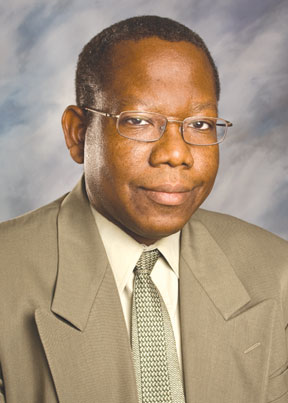Lincoln Edwards, PhD, SD’09, Associate Professor, Center for Dental Research at Loma Linda University School of Dentistry, recently was awarded a $445,000 grant from the National Institute of Diabetes and Digestive and Kidney Diseases (NIDDK) for the purpose of experimenting on a special breed of rats utilizing a novel compound known by the title S43126. The granted project is entitled, “Novel Imidazoline compound as Antidiabetic Agent.”

From his fairly well lit dungeon office in the northeast basement corner of 75-year-old Edward Risley Hall, Dr. Edwards lives the glamorous life of the scientific researcher. Papers spill out of boxes on his office floor partially returned as they are from a sudden evacuation in December 2010 when burst water pipes caused the ceiling to collapse, inundate his 225 square foot work area, and form a shallow, artificial lake.
Dr. Edwards obtained his doctorate in Pharmacology from Loma Linda University and then continued his studies at Case Western Reserve University (CWRU) where he completed a three-year Postdoctoral Fellowship in pharmacology and nutrition, before earning his doctor of dental surgery degree at LLUSD.
While working with Dr. Paul Ernsberger, associate professor of Nutrition/Neuroscience/Pharmacology at CWRU, Dr. Edwards became interested in the signaling pathways coupled to the imidazoline receptors that appear to play a significant role in Metabolic Syndrome and type 2 diabetes.
Most dental professionals are aware that the high incidence of type 2 diabetes in the United States has a significant impact on periodontal disease. Copious evidence establishes the link between type 1 and 2 diabetes and periodontal disease. Diabetes is known to cause dysfunctional changes in blood vessels and the production of high levels of specific inflammatory chemicals (such as interleukins) that significantly increase the likelihood of periodontal disease and infection in general. High concentrations of triglycerides (which are common in type 2 diabetes) also appear to degrade periodontal health. Obesity, common in people with type 2 diabetes, may also predispose a person to gum disease. Stabilizing blood sugar in both type 1 and 2 diabetes sufferers may help reduce periodontal problems.
The recent grant will permit Dr. Edwards to pursue the development of imidazoline compounds as antidiabetic agents. These novel compounds have the potential to treat both insulin resistance and hypertension that tends to cluster with diabetes and are not associated with the serious side effects that are reported for current diabetic medications. Some of the funding will go toward the purchase of fatty Zucker rats bred to be a genetic model for research on type 2 diabetes and hypertension. These rodents are fully diabetic by 12 weeks of age and also have high blood pressure.
As the 2011 academic year begins, Dr. Edwards is teaching two physiology courses and one class in pharmacology that limits the time he can devote to research. But the new grant may provide him with a research assistant and thereby facilitate the more rapid march of his scientific efforts to better the lives of members of his own species.
Beyond having his research funded by the NIDDK, Dr. Edwards has been invited to address that institute as well as the American Society for Pharmacology and Experimental Therapeutics. He also has served as a grant reviewer for The American Heart Association Western States Affiliate and reviewed papers for the Journal of Public Health Dentistry, Comparative Biochemistry and Physiology, and Endocrinology & Metabolic Syndrome.
Dr. Edwards has several scientific journal articles and abstracts on his resume. Most recently (April 2010), the NIDDK awarded Dr. Edwards both a Certificate of Achievement and an Excellence in Research award “in recognition of an exemplary research presentation at the Marco Cabrera Poster Session of the Network of Minority Research Investigators 8th Annual Workshop” where Dr. Edwards won first place for best poster presentation in the Basic Science category.
Despite his preoccupying professional life, Dr. Edwards makes time to nurture his spiritual life. He has served for many years as an elder of the Redlands Seventh-day Adventist Church, and he currently teaches Sabbath School classes there as well as at the Kansas Avenue SDA Church in Riverside. He credits much of his success to the love and patience of his dear wife, Sandra, and his children: Alex, Ross-Andre, and Alexa.
Dr. Edwards believes that one should embrace every opportunity for training and learning, for, he says, “it is only when we are well prepared that we can offer the greatest service to our creator God.”
